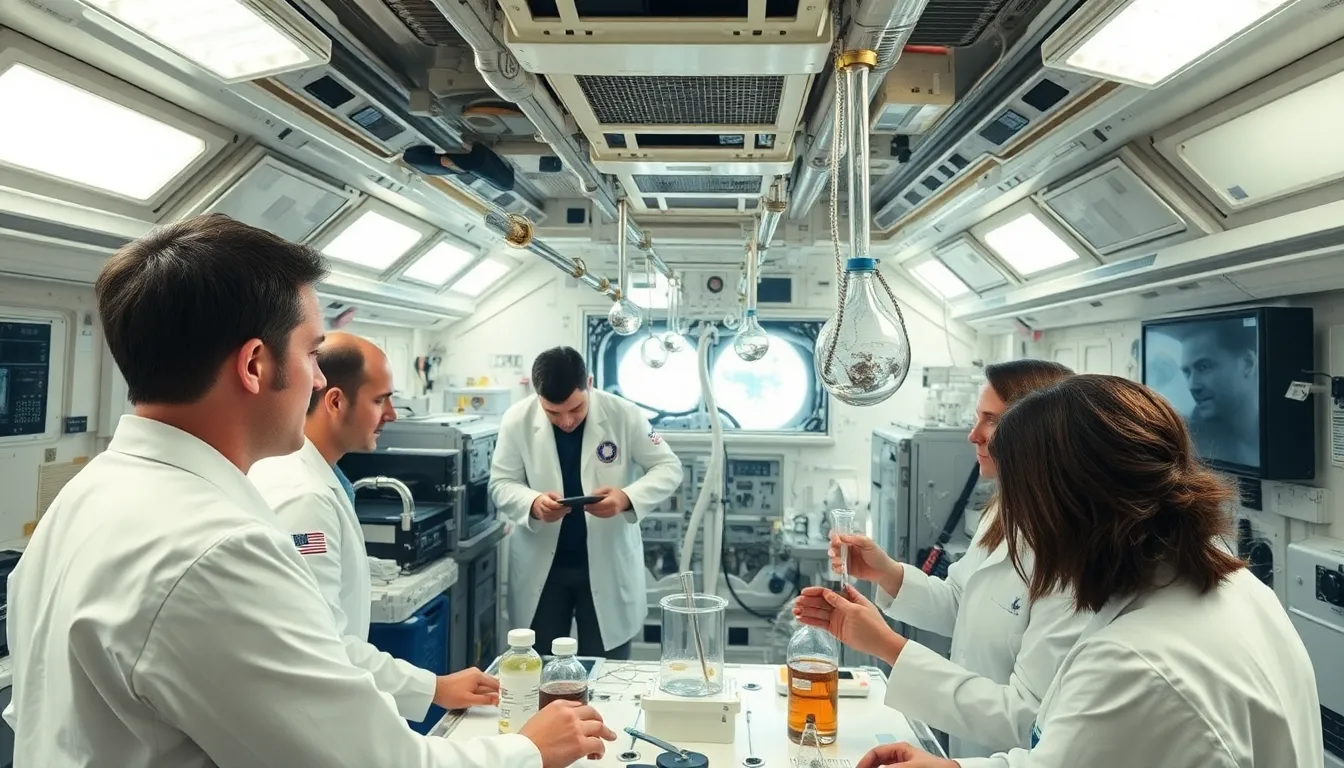Table of Contents
ToggleImagine floating in a tin can high above Earth, surrounded by nothing but the vastness of space. Sounds like a sci-fi movie, right? But for astronauts on the International Space Station, this is just another day at the office. Space station research isn’t just about zero gravity experiments; it’s a cosmic playground where scientists push the boundaries of human knowledge and technology.
Overview of Space Station Research
Space station research encompasses a wide range of scientific disciplines. Astronauts aboard the International Space Station (ISS) conduct experiments in various fields, including biology, physics, and materials science. These studies benefit from the microgravity environment, allowing for unique observations not possible on Earth.
Biological research focuses on understanding how living organisms adapt to space conditions. Some experiments investigate the effects of microgravity on human health, while others explore plant growth in space. Investigating these adaptations helps scientists develop countermeasures against potential long-term health risks for astronauts.
Physics experiments often examine fundamental forces and particles. Researchers study fluid dynamics in microgravity, revealing insights into behaviors that remain hidden on Earth. Understanding these principles provides crucial knowledge in areas like propulsion and energy generation.
Materials science research advances the development of new materials. Experiments on the ISS test materials under extreme conditions, leading to stronger and lighter substances. Such discoveries can revolutionize industries like aerospace, construction, and energy.
Collaborative efforts among global scientific communities drive advancements in space research. Various space agencies, including NASA, ESA, and Roscosmos, partner on projects, fostering international collaboration. Sharing knowledge and resources enhances research outcomes and accelerates technological innovations.
The unique environment of the space station plays a vital role in pushing the boundaries of scientific understanding. Researchers conduct experiments that differ significantly from those performed on Earth. This research not only expands human knowledge but also supports the long-term goal of sustaining human life in space for future exploration missions.
Importance of Space Station Research

Space station research plays a pivotal role in advancing human understanding. The International Space Station (ISS) enables groundbreaking investigations across various scientific fields.
Scientific Benefits
Microgravity offers unique insights into biological processes. Researchers study the behavior of cells in space, uncovering mechanisms that might lead to medical breakthroughs. In physics, experiments reveal fundamental forces and phenomena that remain hidden on Earth. Observations made in space allow scientists to comprehend events like fluid behavior and combustion under conditions unachievable in terrestrial settings. As plants grow differently in space, understanding these effects aids in developing sustainable agriculture for future long-duration missions.
Technological Advancements
Innovation in materials science significantly progresses through space research. Testing materials under extreme conditions generates stronger and lighter substances. These advancements inform sectors, including aerospace and engineering, facilitating the creation of better technologies. Space station research also escalates the development of life-support systems, enhancing safety for astronauts. Moreover, the collaborative efforts among international agencies yield technologies that bolster Earth-bound applications, such as improved telecommunications and robotics.
Key Research Areas
Research aboard the International Space Station (ISS) encompasses diverse fields, each contributing to scientific progress. The unique microgravity environment leads to groundbreaking discoveries across several key areas.
Human Health and Physiology
Studies focus on the impact of microgravity on human health. Researchers examine how prolonged exposure affects muscle atrophy and bone density loss. Insights into cardiovascular health during space missions provide valuable data for future deep-space exploration. Psychology also plays a role, as understanding crew dynamics helps in managing long-duration missions. Investigations into the human immune system reveal vulnerabilities under stress, guiding countermeasures for astronauts. Findings from these studies could lead to innovations in medical treatments for conditions on Earth.
Microgravity Effects on Materials
Materials science research takes advantage of microgravity to observe how materials behave without gravitational influences. Experiments reveal unique properties in metal alloys and polymers. These observations help scientists create stronger, lighter materials. Research also uncovers the fundamental behaviors of fluids, contributing to advancements in engineering and manufacturing processes. Insights gained can lead to improved designs in aerospace components and infrastructure. Outcomes have the potential to revolutionize industries that rely on cutting-edge materials.
Space Agriculture
Cultivating plants in space is crucial for sustainable long-term missions. Research on plant growth under microgravity conditions yields valuable information about the necessities for food production. Scientists explore how varying light conditions and nutrient delivery systems affect plant health. These experiments hold promise for developing efficient agricultural systems for future space habitats. Successfully growing crops in space contributes to astronaut nutrition and psychological well-being. Lessons learned may also enhance agricultural practices on Earth, addressing global food security challenges.
Notable Experiments Conducted
Research on the ISS encompasses a variety of notable experiments that advance understanding across multiple scientific fields.
Protein Crystal Growth
Protein crystal growth studies benefit significantly from microgravity. Under these unique conditions, proteins can form larger and more ordered crystals. Such high-quality crystals lead to improved data for determining molecular structures, essential for drug development. Researchers have observed that defect-free crystals yield clearer X-ray diffraction patterns. These advancements in structural biology may accelerate the discovery of novel treatments for various diseases, including cancer and genetic disorders.
Fluid Dynamics Studies
Fluid dynamics in microgravity presents distinct phenomena compared to Earth’s gravity-driven behavior. Investigations into fluid behavior enable scientists to study capillary action and fluid flow without interference from gravity. Through these studies, researchers gain insights into transport processes fundamental to systems like medical devices and chemical reactions. Results contribute to innovations in fluid management techniques in both space and terrestrial applications. The ability to manipulate fluids in space lays the groundwork for advancements in equipment design for future missions.
Future of Space Station Research
Space station research continues advancing with exciting prospects. Upcoming projects aim to deepen understanding in various scientific fields while enhancing capabilities for future explorations.
Upcoming Projects
NASA’s Artemis program plans to leverage the ISS for missions to the Moon and Mars. By utilizing findings from space station research, scientists will improve life support systems necessary for extended missions. Advanced robotics and artificial intelligence also figure prominently in upcoming projects, facilitating research and operations aboard the station. The European Space Agency’s Earth observation experiments will monitor climate change. Researchers anticipate significant insights that support sustainability efforts on Earth.
International Collaboration
International collaboration remains vital in space station research. Multiple space agencies, including NASA, ESA, and Roscosmos, work together on experiments that span disciplines like biology and material sciences. Cooperative efforts enhance resource sharing and reduce costs associated with research missions. The ISS serves as a shared platform where countries can tackle global challenges, including food production and health advancements. By collaborating internationally, researchers broaden their understanding and accelerate discoveries that benefit both space exploration and life on Earth.
Space station research is paving the way for groundbreaking discoveries that impact both space exploration and life on Earth. The unique microgravity environment of the ISS allows scientists to conduct experiments that reveal insights into biology, physics, and materials science. With each experiment, researchers are not only expanding human knowledge but also developing innovative solutions for challenges like health and food security.
As international collaboration continues to thrive, the potential for future advancements grows. Upcoming projects promise to deepen understanding and enhance capabilities for long-duration missions. The work done aboard the ISS is crucial for preparing humanity for future exploration while also benefiting life on our planet. The journey of discovery is just beginning, and the ISS remains at the forefront of scientific innovation.





